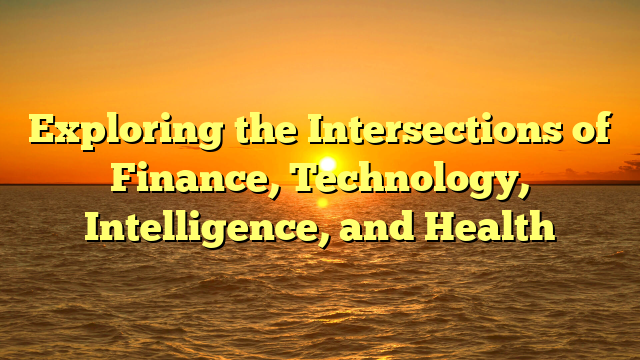
—
In the modern world, four key domains play a crucial role in shaping our future: finance, technology, intelligence, and health. These areas are deeply interconnected, influencing and transforming each other. As we move further into the 21st century, their impact on our lives and societies is becoming more profound. situs slot resmi server luar negeri explores the current trends, challenges, and innovations in these sectors, providing a comprehensive outlook on how they are evolving and intersecting.
Finance: The Changing Landscape of Global Economies
Finance has experienced profound shifts over the last few years. Technological advancements such as blockchain, digital currencies, and AI-driven analytics have disrupted traditional financial systems. Decentralized finance (DeFi) has emerged as a powerful force, offering new ways for individuals and institutions to access financial services and invest in global markets.
The fintech boom is redefining personal finance. With the advent of mobile apps, blockchain-based platforms, and AI-driven investment tools, individuals now have greater control over their finances than ever before. Digital banking and micro-investing platforms have made it easier for people to save and invest, often with lower fees and greater convenience.
Technology: The Catalyst for Change
Technology is at the core of progress in finance, intelligence, and health. The application of AI, machine learning, and data analytics is transforming the way industries operate. In finance, technology is enhancing risk management, improving decision-making, and fostering innovation. Healthcare is experiencing a similar transformation, with AI being used to optimize patient care and predict outcomes. The influence of technology continues to expand, reshaping nearly every aspect of society.
Furthermore, the rapid growth of cloud computing has allowed businesses to store and process vast amounts of data, enabling more sophisticated analysis and decision-making. This trend is evident in industries like finance, where data analytics is increasingly used to predict trends and optimize investment strategies. Similarly, in healthcare, cloud platforms facilitate the sharing of medical records, leading to improved collaboration and better patient care.
Intelligence: The Role of Artificial Intelligence in Shaping the Future
Artificial intelligence (AI) is rapidly changing the landscape of multiple industries, including finance, healthcare, and beyond. In finance, AI is used to optimize investments, identify market patterns, and reduce human error. In healthcare, AI-powered tools are improving diagnostic accuracy and enabling personalized treatments that are tailored to a patient’s unique genetic profile. The integration of AI into these fields is enhancing both efficiency and outcomes.
The rise of AI brings both exciting opportunities and serious challenges. On one hand, AI can enhance efficiency and productivity in finance, healthcare, and many other industries. On the other hand, ethical issues such as privacy concerns, algorithmic biases, and the potential loss of jobs due to automation must be carefully managed. Developing a responsible framework for AI adoption is essential to maximizing its benefits while minimizing its risks.
Health: The Intersection of Technology and Well-being
Health and technology are increasingly intertwined, particularly in the realms of personalized medicine and wellness. Advances in genetic research, along with the use of AI and big data, are enabling more personalized and targeted treatments. Precision medicine, which tailors medical treatments to individuals based on their genetic information, is becoming a reality. Additionally, wearable health devices like smartwatches and fitness trackers are helping individuals monitor their health in real-time, providing valuable insights into their physical well-being.
Moreover, telemedicine has become an essential tool in improving access to healthcare. The rise of virtual consultations, especially during the COVID-19 pandemic, has made healthcare more accessible for individuals in remote areas or those with mobility challenges. Telemedicine platforms allow patients to consult with healthcare providers from the comfort of their homes, reducing travel time and improving efficiency in healthcare delivery.
—
Ultimately, the convergence of finance, technology, intelligence, and health presents exciting possibilities for the future. By embracing innovation in these areas, we can expect a future where access to resources, personalized services, and improved quality of life become a reality for people around the globe.





